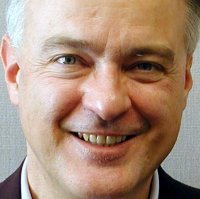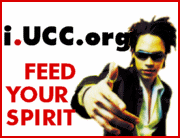At least 25 churches ordain homosexuals
Global trend: World's oldest Protestant churches now ordain gays and lesbians
by Andy Lang
United Church News
June 2002
The United Church of Christ was a minority of one 30 years ago when the Rev. William R. Johnson became the first openly gay man ordained to Christian ministry.
The ordination was controversial. Critics wondered if the UCC was taking a risk that endangered its relationship with other churches. Some feared the church would be drummed out of the ecumenical movement if it continued to ordain gays and lesbians.
But that never happened. Instead, a number of Protestant, Anglican and Old Catholic churches have moved in the same direction, including nine of the UCC's partners in the World Alliance of Reformed churches.
The trend started with the Evangelical Lutheran Church in the Netherlands, which decided soon after Johnson's ordination that lesbians and gays could serve openly as pastors. Since then, the practice has spread to 25 other churches—among them the oldest Protestant churches in Europe.
Sexual orientation is no longer a barrier to ordination in the Evangelical Church of the Union (EKU), the German ancestor of the UCC's Evangelical tradition. Its territory includes the capital city of the Protestant Reformation—Luther's Wittenberg. Homosexuals also can be ordained in the Reformed churches of Germany and Switzerland, the forebears of the UCC's Reformed tradition. The city once known as the "Reformed Rome"—John Calvin's Geneva—is no longer hostile territory for lesbians and gays called to Christian ministry.
Most of the historic Lutheran and Reformed churches in Germany and northern Europe now welcome homosexuals into ordained ministry.
Europe heads the list with 19 churches where homosexuals can be legally ordained. But several denominations in Africa, North America and the Pacific are also joining the trend, including the Anglican church in South Africa formerly led by Archbishop Desmond Tutu, the United Church of Canada, the Episcopal Church in the U.S. and the Uniting Church in Australia.
Besides these Protestant and Anglican churches, at least three of Europe's "Old Catholic" churches permit the ordination of gays and lesbians. These are churches in the Roman Catholic tradition that broke with the Vatican in the 19th century.
Many churches have adopted uniform policies that expressly permit homosexuals to serve as priests or ministers. In others, the policy is either neutral or implicit, leaving the decision to a regional or local authority.
Practices are not consistent from church to church, but in all of them church leaders have either ordained openly homosexual candidates for ministry or signaled their willingness to do so.
The issue deeply divides some of the churches where lesbians and gays have been ordained. Open conflict has broken out in the Anglican Communion. The church's international conference of bishops in 1998 rejected "homosexual practice" as "incompatible with Scripture," but defeated a resolution condemning bishops who "knowingly ordain" gays and lesbians. Some Anglican bishops in Asia and Africa, despairing at the trend towards greater acceptance of homosexuals in the Episcopal Church, have threatened to break relations with U.S. bishops. Other churches have lost members and even entire congregations who feel they cannot coexist with openly gay clergy.
But in most churches, the trend is to recognize a diversity of practice—to "agree to disagree." In these churches there is continued debate, but homosexuality is no longer considered a church-dividing issue.
Many Protestant churches are still sorting out unresolved issues, with the result that policies are sometimes ambiguous or contradictory. Celibacy, for example, is generally not required by those German churches that ordain homosexuals, but some forbid gay pastors to live with their life partners in parish housing. That policy, critics say, has the unintended effect of splitting monogamous couples from each other, and sends mixed messages to the gay community about the church's commitment to lifelong fidelity as the ideal for human relationships. While the trend is towards inclusion of lesbians and gays in the ordained ministry, acceptance of homosexual pastors in Germany is often a quiet affair, not a confident proclamation that a consensus exists on the morality of same-gender relationships.
The 26 churches have a total membership of nearly 57 million.
Churches where homosexuals can legally be ordained
Anglican
Church of the Province of Southern Africa*, Episcopal Church (USA)*, Scottish Episcopal Church*, Anglican Church of Canada*
Baptist
Alliance of Baptists (USA)*
Christian
Christian Church (Disciples of Christ)*
Lutheran
Church of Denmark*, Church of Norway, Church of Sweden*, Evangelical Church of the Augsburg Confession (Austria), Evangelical Lutheran Church of Finland*, Evangelical Lutheran Church in the Kingdom of the Netherlands, United Evangelical Lutheran Church of Germany*
Old Catholic
Old Catholic Church of Austria, Old Catholic Church in the Netherlands*, Old Catholic Diocese of Germany*
Reformed and United
Evangelical Church of the Helvetic Confession (Austria), Evangelical Church of the Union (Germany)*, Evangelical Reformed Church (Germany)*, Evangelical Reformed Churches of Switzerland*, Evangelical Waldensian Church (Italy)*, Netherlands Reformed Church, Reformed Churches in the Netherlands, Remonstrant Brotherhood (Netherlands), Uniting Church in Australia*, United Church of Canada, United Church of Christ (USA)*, United Protestant Church of Belgium*
At the time this article was published, churches marked with an asterisk had no explicit churchwide policy permitting or prohibiting the ordination of gays and lesbians. Generally, churches without a normative policy leave the decision to regional or local bodies, some of which are willing to ordain homosexual candidates. In some churches this amounts to a churchwide practice, since no ordaining bodies discriminate against homosexual candidates for ministry.
In Germany, a majority of Lutheran, United and Reformed Landeskirchen (regional churches) permit the ordination of homosexuals without requiring celibacy. In the United Protestant Church in Belgium, homosexuals generally can be ordained in Dutch, but not in French, congregations. The General Synod of the Church of Norway, voted in 1997 to oppose the ordination of homosexuals living with a partner, but four of the eleven Norwegian bishops have declared that this policy is not binding in their dioceses. The issue is still in dispute. There is no churchwide policy in the Evangelical Lutheran Church of Finland, and at least one bishop has declared his willingness to ordain homosexuals. Other Finnish bishops have said they will do so only if the ordinand commits to lifelong celibacy.
In 2004 the Netherlands Reformed Church, Reformed Churches in the Netherlands and the Evangelical Lutheran Church in the Kingdom of the Netherlands united into the Protestant Church of the Netherlands (PKN). It maintains the policies of its predecessor denominations permitting the ordination of homosexual ministers and the union of same-sex couples.
Because of the threat of schism in the Anglican Communion, some of the churches listed here may have rescinded implicit policies allowing gay ordinations.
This article was originally published in United Church News at news.ucc.org.



1 Comments:
Although it would no longer be considered a Christian church, the Unitarian Universalist Association not only allows the ordination of Homosexual ministers but has a program of the "welcoming Congregation" (which both Shaker and West shore churches in Cleveland participate in) which explicitely reaches out to the Homosexual community and says "You are welcome here".
http://www.uua.org/obgltc/resource/history.html
Post a Comment
<< Home